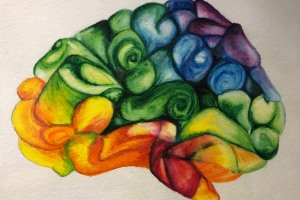PROVIDENCE, R.I. [Brown University] — In the first week of Brown’s spring semester, students in Leon Hilton’s course pored over articles in academic journals. A month later, they dug into an emotional memoir. Throughout the semester, their discussions crossed into realms of political theory, women’s and gender studies, biology, anthropology, ethnic studies and more.
Hilton’s course, titled Neurodiversity: Science, Politics, Culture, lives at the intersection of culture and science — as does its primary subject.
“Neurodiversity, or neurodivergence, is a concept first proposed and developed in online disability and autism communities in the 1990s and early 2000s,” said Hilton, an assistant professor of theatre arts and performance studies. “But it names an idea that’s older than the term itself — that people who have been subject to certain medical or psychiatric diagnoses should be able to articulate their own experiences. Neurodiversity challenges the commonly held belief that neurological conditions such as autism are inherent deficiencies that need to be corrected or cured, rather than examples of human variation.”
Since January, Hilton and 16 undergraduates have explored academic research and a wide range of theories and perspectives on the subject, discussing the ways in which discrimination against individuals with neurological diagnoses — autism, dyslexia, epilepsy and more — manifests nearly everywhere, from the classroom to the workplace to the doctor’s office.
On May 2 and 3, the class culminates in a symposium titled Neurodiversity in Action. The two-day event, which is free and open to the public, brings together scholars and artists from across the United States for panel discussions, poetry readings, an art exhibit and a theatrical performance by Providence-based Spectrum Theatre Ensemble, all of which focus on recent efforts to raise awareness to the neurodiversity concept.
Neurodiversity in Action is part of a larger effort at Brown to use the arts and humanities to better understand those with neurological differences. A project called Artists and Scientists as Partners (ASaP), spearheaded by Senior Lecturer in Theatre Arts and Performance Studies Julie Strandberg, hosts dance and music classes specifically designed for those with autism and Parkinson’s disease and organizes summer camps for children on the autism spectrum, among other efforts.
“In our ASaP classes, students use site placements, ethnographic studies and design thinking to develop programs and projects that address real-life problems facing neurodiverse populations,” Strandberg said. “Leon Hilton’s course builds on the unprecedented amount of arts, scholarly and scientific research that is being done at Brown in the field of neurodiversity.”
Hilton said he hopes the symposium, like many of the activities led by ASaP, inspires attendees to re-examine their opinions of those who look, act and think differently than they do.
“I think disability touches all of us in various ways,” he said. “Most of us know someone who has a physical disability or who is somehow neurodivergent. Our classrooms and communities are neurodiverse places. It seems really important that we find ways to listen to, and not just pathologize, these different ways of perceiving and engaging with the world.”
In class, Hilton practices what he preaches. When he plays videos, he ensures they include closed captioning. He often signals the transition to a new subject using visual cues alongside verbal cues.
“In most places, if disability is talked about at all, it’s talked about as this awful, tragic thing that happened to this person that we should try to fix,” said Felicia Davidson, a senior in the class. “But we’ve been talking a lot about how disability and neurodivergence can be a strength, can be something you gain from. I think this class almost serves as an experiment for how we can all reframe the idea that a disability is a deficit.”
Yema Yang, also a senior, believes that embracing the concept of neurodiversity can lead to more tolerance for all kinds of differences — racial, physical, political and otherwise.
“This class opens the door to, and is very much connected to, discussions in critical thinking about all disability,” she said. “Neurodivergence is a really important way to forge new paths that are more inclusive of different ideas and different people.”
Hilton said Yang is among a number of students in the class who are members of Project LETS, a grassroots organization founded by Brown alumnae that provides support and advocacy around mental illness. Several others are part of the student-led Disability Justice at Brown, which aims to build cross-disability community through activism. He said it’s been exciting to see Yang and others building on their academic work to effect change outside the classroom.
“I’ve learned so much from the students about how the scholarship on neurodivergence can translate to the world outside academia,” Hilton said. “I’ve seen how they’re using these concepts not just in class but in creating supportive communities with each other. They’re working with these concepts in real life.”
